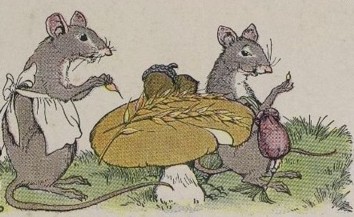| 1. wheat | /weet/ |
| -Wheat is a specific type of grain that is processed into flour for making bread, cakes, etc. | |
| The patient is allergic to wheat. | |
| 2. dash | /dash/ |
| -a small amount of something, especially liquid food, that is added to something else | |
| Add a dash of salt to season the fish. | |
| 3. delight | /dih-LAHYT/ |
| -something that gives great pleasure: | |
| The delight of living in the city encouraged her to finish her studies. | |
| 4. tempting | /TEMP-ting/ |
| -If something is tempting, you want to do or have it | |
| The new fast food was so tempting. | |
| 5. scratch | /skrach/ |
| -to use the nails, claws, etc., for tearing, digging, etc. | |
| The dog’s scratching at the door. He wants to be let in. |

After the meal the friends had a long talk, or rather the Town Mouse talked about her life in the city while the Country Mouse listened. They then went to bed in a cozy nest in the hedgerow and slept in quiet and comfort until morning. In her sleep the Country Mouse dreamed she was a Town Mouse with all the luxuries and delights of city life that her friend had described for her. So the next day when the Town Mouse asked the Country Mouse to go home with her to the city, she gladly said yes.
When they reached the mansion in which the Town Mouse lived, they found on the table in the dining room the leavings of a very fine banquet. There were sweetmeats and jellies, pastries, delicious cheeses, indeed, the most tempting foods that a Mouse can imagine. But just as the Country Mouse was about to nibble a dainty bit of pastry, she heard a Cat mew loudly and scratch at the door. In great fear the Mice scurried to a hiding place, where they lay quite still for a long time, hardly daring to breathe. When at last they ventured back to the feast, the door opened suddenly and in came the servants to clear the table, followed by the House Dog.
The Country Mouse stopped in the Town Mouse’s den only long enough to pick up her carpet bag and umbrella.
“You may have luxuries and dainties that I have not”, she said as she hurried away, “but I prefer my plain food and simple life in the country with the peace and security that go with it.”
Poverty with security is better than plenty in the midst of fear and uncertainty.
| 1. | What did the Country Mouse serve the Town Mouse? |
| 2. | What kinds of food did the mice see in the dining area of the mansion? |
| 3. | At the end, which way of life did the Country Mouse prefer? |
| 1. | How would you describe the characteristics of the Town Mouse? |
| 2. | How would you describe the characteristics of the Country Mouse? |
| 3. | Do you think the Town Mouse is satisfied with its lifestyle? |
| 4. | The fable’s lesson is “Poverty with security is better than plenty in the midst of fear and uncertainty.” Do you agree with this? Why or why not? |
| 5. | Why do you think there are so many poor families in the world? |
| Grammar 文法 |
Pronunciation 発音 | Vocabulary 単語 |
Comprehension 理解 |
|
|---|---|---|---|---|
 GOOD GOOD |
文法の誤りはほとんどなく、完全な文章で話すことができる | ほとんどの単語をはっきりと正しく発音することができる | 習った表現を適切に使うことができる | 文章を理解し、質問に正しく答えることができる |
 FAIR |
文法の誤りはあるが、完全な文章で話すことができる | 発音の練習が必要な言葉がいくつかある | たまにミスはあるが、習った表現を適切に使うことができる | 文章を完全に理解するのは難しく、質問に正しく答えられないときもある |
 POOR |
文章で話すのは難しく、単語だけで話すことができる | 発音の練習が必要である | 習った単語と表現を少しだけ使うことができる | 文章を理解するのは難しく、質問に答えるのは難しい |
An eBook from The Project Gutenberg.
This eBook is for the use of anyone anywhere at no cost and with almost no restrictions whatsoever. You may copy it, give it away or re-use it under the terms of the Project Gutenberg License included with this eBook or online at www.gutenberg.org